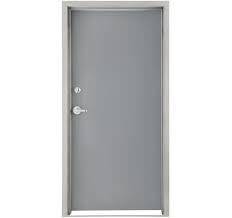Introduction
Hollow metal doors have been a staple in the construction and architectural industry for many years, and for good reason. These doors are renowned for their durability, security, and versatility, making them a popular choice for various applications in both commercial and industrial settings. In this article, we will delve into the world of hollow metal doors, exploring their construction, benefits, and the wide range of applications they serve.
What are Hollow Metal Doors ?
Hollow metal doors, also known as steel doors, are constructed using thin sheets of metal that are formed and reinforced to create a strong and resilient door frame. The core of these doors is typically hollow, which adds to their lightweight nature while maintaining their exceptional strength. The metal used in their construction can vary, but common materials include steel and stainless steel.
Benefits of Hollow Metal Doors
- Durability: Hollow metal doors are built to withstand the test of time. They are resistant to wear and tear, making them an excellent choice for high-traffic areas. Unlike wooden doors, they do not warp, crack, or rot, ensuring they maintain their structural integrity over the years.
- Security: One of the primary advantages of hollow metal doors is their exceptional security features. These doors are incredibly difficult to breach, offering superior protection against forced entry, vandalism, and theft. Their solid metal construction provides peace of mind for property owners and business operators.
- Fire Resistance: Many hollow metal doors are fire-rated, meaning they can withstand high temperatures for a specified period. This feature is crucial for safety in commercial buildings, factories, and other areas where fire protection is essential.
- Customizability: Hollow metal doors are available in a wide range of sizes, styles, and finishes. They can be tailored to fit the aesthetic requirements of any building or space, making them a versatile choice for architects and designers.
- Sound Insulation: In addition to security and fire resistance, hollow metal doors often offer excellent sound insulation properties, making them ideal for spaces where noise control is a concern.
Applications of Hollow Metal Doors
- Commercial Buildings: Hollow metal doors are commonly used in commercial properties, including offices, retail stores, and restaurants. Their durability and security features make them an excellent choice for exterior and interior doors.
- Industrial Facilities: In industrial settings, where security and safety are paramount, hollow metal doors are often installed to protect valuable equipment and assets. They are also used to partition different areas of a facility.
- Educational Institutions: Schools and universities often choose hollow metal doors for their resistance to wear and tear, as well as their ability to withstand the rigors of a busy campus.
- Healthcare Facilities: Hospitals and clinics rely on the durability and hygiene of hollow metal doors. Their resistance to moisture and ease of cleaning make them suitable for healthcare environments.
- Government Buildings: Government buildings, such as courthouses and police stations, use hollow metal doors to ensure security and compliance with safety regulations.
Conclusion
Hollow Metal Door have earned their reputation as reliable, durable, and versatile building components. Their strength, security features, and customizability make them a top choice for architects, builders, and property owners across a wide range of industries. Whether you need to secure a commercial property, enhance the safety of an industrial facility, or improve the aesthetics of your building, hollow metal doors are a robust solution that stands the test of time.

